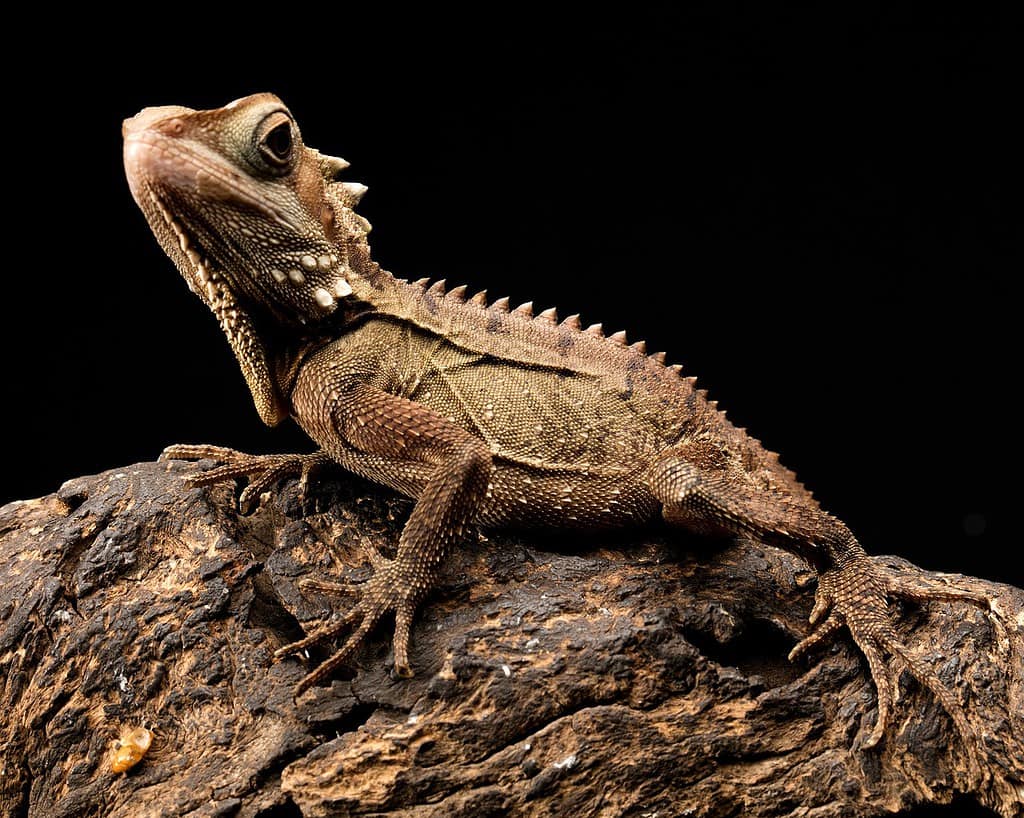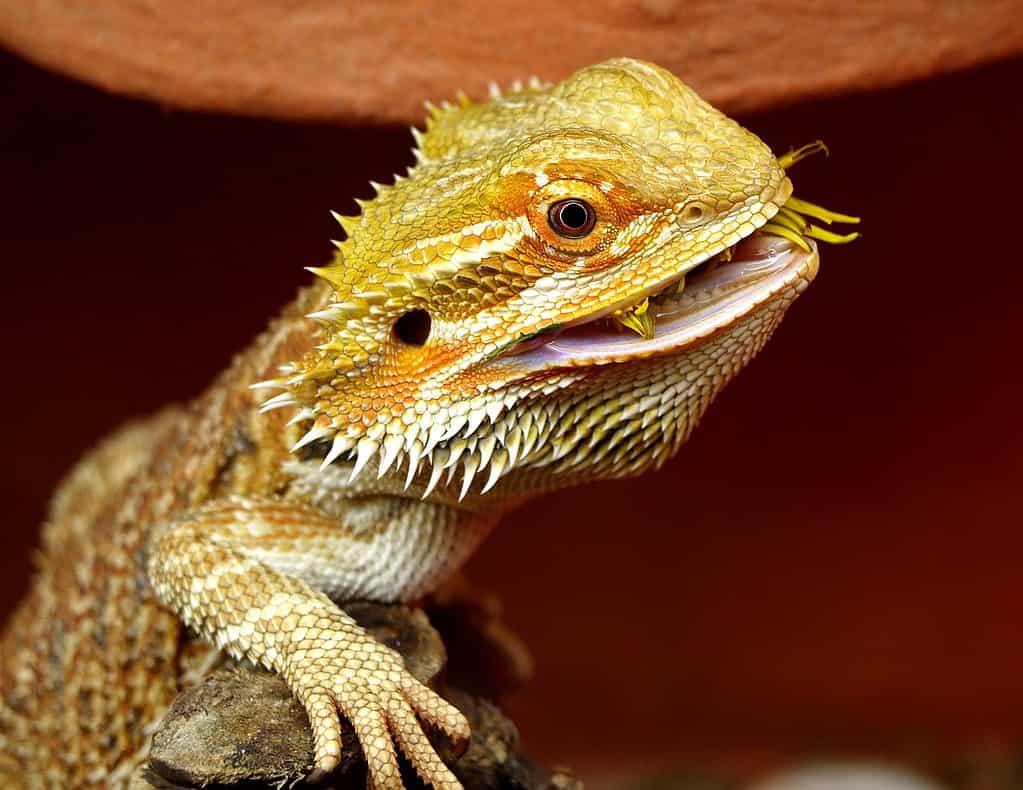Bearded dragons are rapidly gaining popularity as household pets among those who appreciate reptiles. Any pet owner understands it’s essential to research an animal before taking it home so you can provide the best care. But is it difficult to take care of a bearded dragon?

Bearded dragons can be hard to take care of, but getting them into a routine becomes much easier. As your bearded dragon grows and matures, its dietary requirements become significantly simpler. During that period, you will learn about and become accustomed to their way of life.
Bearded dragons are great pets, even though they need a lot of care. Interacting with a bearded dragon is incredibly gratifying if you put in the effort.
How Do I Take Care of a Bearded Dragon?
Diet
Daily fresh vegetable offerings are necessary for adult Beardies. Food that hasn’t been eaten should be taken out of the vivarium within 12 to 18 hours. Vegetables should make up 75-78% of an adult Beardie’s diet and can be fed constantly unless otherwise directed by your veterinarian.
Handling
Beardies need frequent handling to become accustomed to humans, and most of them enjoy human interaction. Most owners of Bearded Dragons even provide their pets with leashes so they may accompany them in secure locations. However, they don’t like long trips, so leave them home while you travel.
Shedding
Beardies shed once a week when they are young, but by the time they are adults, they only shed every 4-6 months. During the shedding process, your Bearded Dragon may have a decreased appetite, and once the process is complete, it will frequently consume its lost skin.
Bathing
In most cases, Bearded Dragons don’t need baths. If your pet walks through garbage, you might want to clean it down with some disinfectant. Using warm water while cleaning is an effective treatment for constipation and blocked shed. Adding a detergent or anything else in the water while cleaning is not essential unless your veterinarian specifically recommends doing so.
Semi-Hibernation
Bearded Dragons enter a condition of semi-hibernation known as brumation throughout the year’s colder months. This causes them to reduce their appetite greatly, and they may appear lethargic or sleep much more than usual. If you’re unclear if your pet is unwell or having a semi-hibernation state, let your vet examine it.
Why Can Bearded Dragons Be Difficult to Keep as Pets?
They Need a Strict Diet
Bearded dragons are omnivores, requiring a particular ratio of insects to vegetables in their diet, which changes depending on their size and age.
You’ll need to conduct your own investigation and consult a veterinarian about this matter. You’ll need to change the number of bugs and vegetables that you provide to them each day as time goes on. Young bearded dragons eat more insects and fewer greens. The ratio will level out as they mature and grow.
Bearded dragons also need calcium, which varies with age. If they don’t receive enough calcium, it might impair their growth and bones; too much could cause a calcium overdose.
Maintaining the Tank Takes Time and Effort
To keep them clean and healthy, their food or water bowls must be washed every day in warm, soapy water. In addition, to avoid bacterial infections, it is necessary to clean the tank thoroughly and remove any waste, uneaten food, and still-alive insects. Around once a month, each other components of the enclosure, such as the sand, the rocks, and the other ornamentation, must be cleaned and replaced.
They Need Heat and Humidity
If it is not appropriately monitored, either an excessive or insufficient amount of heat might result in health concerns. Lighting is essential when one has a bearded dragon, and the bulbs in their lights must be replaced.
Your bearded dragon can be affected by the humidity of where you live. Infections of the respiratory tract can be brought on by excessive moisture. Keeping the water outside the cage might be best if you live in a humid area.
It’s Hard to Find Reptile Vets
Finding a good veterinarian may be challenging and sometimes requires a significant distance. The majority of veterinarians do not have an adequate understanding of reptiles. So, it’s in your greatest interest to look up specialized vets near you and find out how far they are.
They Can’t Live With Others
Bearded dragons are known to be possessive of their territory and have specific environmental needs that other types of pets cannot meet. In addition, it is not advised to simultaneously have two bearded dragons in the same enclosure. There is a good chance they will struggle with one another for supremacy.

They’re Fragile
Bearded Dragons are small, which is a good thing but can also be a bad thing. They’re more prone to accidents like dropping them and bone disorders. The most effective strategy to shield them from these effects is to ensure that they receive enough vitamin D. This can be accomplished by either taking them outside or ensuring that the UV light in their tank is strong enough.
Parasites Can Infect Them
There is a possibility that your dragon might become unwell if its cages are not cleaned regularly, and bacteria can make their way into the enclosure. If you are busy most of the time, you may want to think twice about getting a bearded dragon. It’s possible that learning that it doesn’t take much for germs to accumulate in the enclosure will surprise you.
They Are Expensive
Their enclosures must be more than 40 feet long and tall. It can be hard to find these tanks, and they often cost a lot. The lack of space might stress your dragon and cause health complications. Their food costs can vary, but you can avoid these costs if you raise the insects yourself.
In addition, although crickets are readily available, they have a short lifespan (just a few days), and there is always a remote possibility that they may be infected with a disease. UV lights are also expensive and need new bulbs once or twice a year.
Why Do Bearded Dragons Make Such Excellent Pets?
Bearded Dragons are gentle and curious, making them good pets. They are naturally diurnal, which means they are active throughout the day. Therefore owners of Beardies will frequently see them out and about in their cages. They spend most of the time basking in the sun or eating; they sleep as people do at night.
They need some attention every day to be healthy and happy. You’ll have to check the substrate in their cage daily to ensure it isn’t dirty with waste. In addition, they need access to clean water at all times, and any liquid left over must be replenished with clean water.
